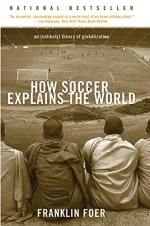How Soccer Explains the World
A book review.

How Soccer Explains the World
by Franklin Foer
published: 2004
ISBN: 0060731427
genre: Social Science
reviewed:2006.04.19
This is a book that covers the history of the late 20th century and events up to the current day. Through the world of soccer, it explores themes such as the use of power, cultural struggles, organized crime, and personal identity.
It's an intriguing idea. Soccer, played in every corner of the globe, is a seemingly innocent activity. But the author shows how it has been politicized on many levels, in different places.
Ranging from the organized militias of the Balkans to the fine divisions of class and inclination in middle-class America, the author outlines how soccer has been used and abused. Foer follows the career arcs of hooligans, warriors and soccer stars in his exploration of these political ramifications, and to an extent this is convincing.
What's particularly strong is the reach of the author's travels in researching this book. You have to admit that an author who's tracked down an African soccer player who's scraping by in the former Soviet Union is doing his legwork. So, too when that author interviews Balkan militiamen and crimelords in various place.
If the book has a shortcoming, it's in its political slant. I find an exploration of socio-political issues more compelling when it retains a certain neutrality in tone and content (and for that matter when it avoids putting too much of one's ego into the work). An excellent recent example of such neutrality is Alan Weisman's The World Without Us. And it's here that this book loses me. I find myself, for instance, wondering why Jewish issues seem to come up so persistently in How Soccer Explains the World. The relentless cheering for one viewpoint seems odd in a book that goes to great lengths to depict the hazards of such affiliation.